Giovanna Fragneto
ILL Senior Fellow for Soft Matter
(Information collected in May 2010)
Your studies? Scientific field?
I have always been a good student and enjoyed all subjects at school. I was fascinated by writers and wished to become one one day. The summer I had to decide about my university studies I read an article in an Italian newspaper entitled ”Do you want to become a writer? Enrol at a scientific faculty”. And so it all started. I obtained my first degree at the faculty of Chemistry of the University of Naples. The last year of my undergraduate studies I spent 10 months at the University of East Anglia, Norwich, under the EC Erasmus scheme. Initially my intentions were to improve my English and experience the way of living of a fascinating country. During my stay, I worked on water-in-oil microemulsions and saw for the first time a big neutron facility, ISIS. How impressive. My supervisor, Brian Robinson, suggested that I should do a PhD and that the best place to go would be Oxford. Until then it had never crossed my mind that I could become a scientist, I thought that this was reserved only to very bright people. I liked nevertheless the idea and sent a letter to Bob Thomas asking whether there was any position available in his group. It worked well and I spent three enlightening years in Oxford.
Neutron-scattering background?
My PhD work involved the study of the adsorption of surfactants and proteins at solid/liquid interfaces by neutron reflectivity. During that time I had the luck to spend many days (and nights…) at neutron facilities like ISIS, NIST and ILL. I was born in a place by the mountains, no wonder that doing experiments at the ILL made a strong impression on me. After the PhD, the force pulling towards south brought me in Paris for a one year post-doc funded by an EC network grant. It was great to be in Paris and learn French so that I could read the original versions of the XIX century French literature, my preferred reading at the time. In the wonderful scientific environment of the Institut Curie I became fascinated with biophysics and monolayers on liquid surfaces. When I went to Paris I had decided to move away from neutrons, and get some “normal daily hours” job, but the quest for sunshine was ever pressing and when I saw the advert for a Marie Curie fellowship at the ILL to look at the interaction of lipids with a peptide I jumped on it. These two years post-doc spent at the ILL (from 1997 to 1999) have been probably the most important of my career. In collaboration with scientists of the physics department of the university of Grenoble we developed a new model for biological membranes that has encountered a great success with the international community. I have not yet left Grenoble and the ILL.
Step by step to my position?
At the end of my post-doc a position became available as instrument scientist on the small angle diffractometer D16. I commissioned this instrument that had just moved to a new guide. During the years on D16 I acted as local contact for most soft matter and biology experiments also on the reflectometer D17, had many overlapping experiments on the two instruments and spent long hours in the ILL7 hall. When the idea to build a new reflectometer, FIGARO, became concrete and I was appointed leading scientist for the project, I left D16 and joined temporarily the D17 team until the new reflectometer would come on line. In parallel I continued with my research activities revolving around the structural characterization of model biological membranes and this led to the award in 2006 of the BTM Willis prize in the UK. Since 2004 I have supported the idea of creating a Partnership for Soft Condensed Matter with the ESRF. This has helped me obtaining my current position of Senior Fellow in Soft Matter although I don’t feel so “Senior” neither so “Fellow”….
Any difficulties because of your gender?
Difficult question to answer. In recent years when efforts are being put in place to improve gender equality, there have been times when I have even thought that this had helped me in my career. In reality, I have always worked hard and think that I have deserved the positions I obtained. I feel that sometimes I have had to work harder than my male colleagues to get the same level of consideration. I have recently joined a French association of women in science and we often discuss the concern that usually women do not get to the highest positions in workplaces since they are often more modest, less ambitious and less aggressive than men when the occasion arrives. In a working environment like that at the ILL it is difficult for a woman to get to a management position in science. I don’t think I could succeed in that (am I being modest here? if not modest certainly honest….).
Publications?
Around 80 in peer-reviewed international journals and books. Many papers in popular press, ILL annual report, Neutron News, etc. Many invitations to national and international conferences and organizer of a few international workshops too.
Percentage time for your family/ work/ for you?
I have two children, a son born during my post-doc in Paris in 1996 and a daughter born in 2002. I went to high school in the same class as my husband and he has followed me around since. He and the children have been very supportive (but we had crisis moments too….) and it has proved hard to make him (who is not a scientist) understand the reasons for such great involvement in my work. I am not sure after all these years that he has understood them fully yet, but I believe he has been better than many other men in similar situations. I have had to juggle a lot to keep the balance between work and family. Luckily good health has helped not going mad. When in the last few years I got a more stable position and I saw that many people around me were devoting more time to their families than I ever did, I changed attitude so that my daughter has benefited more from my presence (at least physical even if often in company of my laptop….) than her brother did in the first years of his life. Despite this, they are both wonderful children. Needless to say that since they were born no time has been left “for me”. I haven’t lost hope that this will change though….
Who or what is your mentor or greatest inspiration?
A great source of inspiration have been the women of my family particularly my grandmother and my mother. They have been clever independent women and passionate workers. I have been very lucky to have had three sisters so that I did not experience the difference of education between girls and boys.
Bob Thomas has been a great mentor and is still a big source of inspiration.
What is the most challenging thing you have faced in your career?
I am facing now the challenging task of creating the Partnership for Soft Matter with the ESRF, which includes the setting up of laboratories and the quest of fundings and associate partners. Strange as it may seem I found it easier to obtain 3M€ to build a new instrument than a thirtieth of this amount to run an entire lab.
Contact details
Giovanna Fragneto
Institut Laue-Langevin
b.p. 156 F-38042 Grenoble
tel. +33 (0)4 7620 7062
sec. +33(0)4 7620 7356
fax. +33(0)4 7620 7120
webpage
Interview with Giovanna Fragnetto about the JRA Advanced Neutron Tools for Soft and Bio-Materials here!
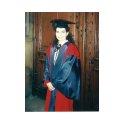
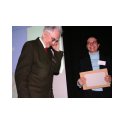
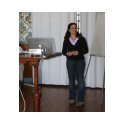
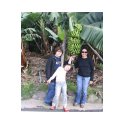
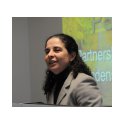 Back to previous page
Back to previous page
